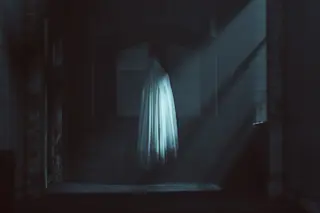Are people who believe in the afterlife more likely to react to a supernatural event — say, the sudden appearance of a ghostly apparition — than those who say they don’t?
Psychologist Jesse Bering and his colleagues at the University of Otago tested this very question, according to a recent study. And in their attempts to unravel the connection between our beliefs in the afterlife and behavior regarding the supernatural, the scientists weren't afraid to take a spookily creative approach.
After being recruited for an apparent "mindfulness" task, one hundred volunteers were asked a series of questions evaluating their belief in the afterlife, their religious identity, and their belief in God. They then listened to a popular 9-minute mindfulness recording in a small, private, closed-door room. In the target condition of the study, participants were casually told that a janitor had recently passed away in that room, and that "one ...















